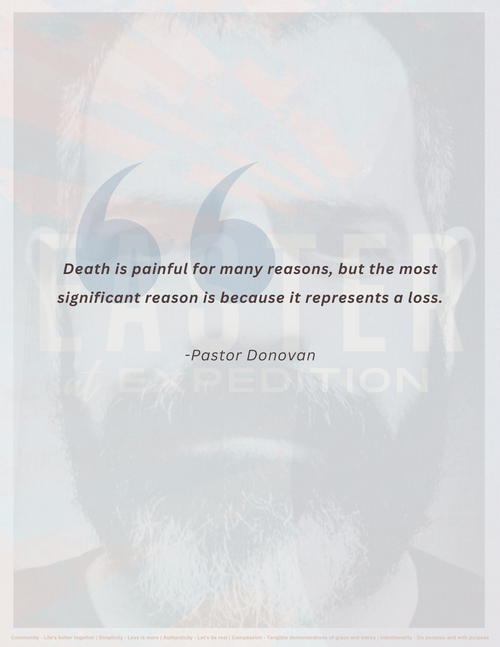Easter Follow-up

I’m sure it’s no surprise to any of you that I deal with an unusually disproportionate amount of dying and death. It goes with the territory of being a pastor.
After being in Payson for 26 years, I know my way around the hospital. The funeral home knows me personally. I know who many of the crosses on the side of the road represent. I knew the person and their spouse and their kids.
The impact of death on their loved ones are moments I’ll never forget.
Dad - Daughter had overdosed. Took his teenage daughter's body off of life support.
Wife - When the brain tumor finally took her young husband's life.
Mom - Wailing on the floor with her toddler.
I can, without a doubt, tell you that the most painful, gut-wrenching conversations I’ve had with people have been dealing with death.
Jesus encountered something similar.
The Bible specifically mentions Jesus’ crying three times. I’m certain there were more, we just don’t know about them.
He wept over Jerusalem as He approached the city because of their sin, he wept in the garden shortly before his crucifixion and he wept after his friend Lazarus died.
John 11:32–35
[32] Now when Mary came to where Jesus was and saw him, she fell at his feet, saying to him, “Lord, if you had been here, my brother would not have died.” [33] When Jesus saw her weeping, and the Jews who had come with her also weeping, he was deeply moved in his spirit and greatly troubled. [34] And he said, “Where have you laid him?” They said to him, “Lord, come and see.” [35] Jesus wept.
Death is painful for many reasons, but the most significant reason is because it represents a loss.
After being in Payson for 26 years, I know my way around the hospital. The funeral home knows me personally. I know who many of the crosses on the side of the road represent. I knew the person and their spouse and their kids.
The impact of death on their loved ones are moments I’ll never forget.
Dad - Daughter had overdosed. Took his teenage daughter's body off of life support.
Wife - When the brain tumor finally took her young husband's life.
Mom - Wailing on the floor with her toddler.
I can, without a doubt, tell you that the most painful, gut-wrenching conversations I’ve had with people have been dealing with death.
Jesus encountered something similar.
The Bible specifically mentions Jesus’ crying three times. I’m certain there were more, we just don’t know about them.
He wept over Jerusalem as He approached the city because of their sin, he wept in the garden shortly before his crucifixion and he wept after his friend Lazarus died.
John 11:32–35
[32] Now when Mary came to where Jesus was and saw him, she fell at his feet, saying to him, “Lord, if you had been here, my brother would not have died.” [33] When Jesus saw her weeping, and the Jews who had come with her also weeping, he was deeply moved in his spirit and greatly troubled. [34] And he said, “Where have you laid him?” They said to him, “Lord, come and see.” [35] Jesus wept.
Death is painful for many reasons, but the most significant reason is because it represents a loss.

DEATH AND LOSS
DEATH = LOSS
Something gets lost and we feel like we’ll never get it back.
That’s what grief is all about.
5 stages of grief / 7 stages of grief.
Lots of things die and we grieve in very much the same way we grieve with physical death. It may not be as deep or as intense, but it’s still immensely hard and it very much hurts.
The reason loss is so painful is because it feels so final. Despair and hopelessness are when you feel like something is over. Something is gone and it's gone forever. It’s unrecoverable.
Lucky and family bible
No way to get it back. Sense of loss. Unrecoverable.
Not a phone book. (Under 30…phone books were these things.)
The resurrection of Jesus does something immensely beautiful and powerful.
RESURRECTION HOPE
John 11:25–26
I am the resurrection and the life. Whoever believes in me, though he die, yet shall he live, and everyone who lives and believes in me shall never die.
For a Christian, even if physical death happens to you, it will only make your life better. For centuries, that is the hope that has sustained Christians to face literal physical death.
Death is always painful, but it doesn’t have to be forever painful.
The resurrection unleashes the possibility of all kinds of other resurrections. The resurrection is evidence that even the worst of the worst can be recovered.
RESURRECTION = RECOVERY
The resurrection of Jesus shows us that there’s nothing Jesus can’t bring back to life. Jesus brings life to things that are dead.
I’m not talking about magic tricks. My mother-in-law's family bible went in the trash and it’s rotting in a landfill. Your spouse who has an affair may not want to make the marriage work.
Everything and everyone has a chance to experience some kind of resurrection. There’s nothing that can’t be repaired. There’s nothing that can’t be healed. Some kind of new life coming from a very sad and desperate situation.
1 Thessalonians 4:13
“We don’t grieve as those who have no hope.” Do we grieve? Yes! But we grieve with hope. Hope of what? Resurrection. Recovery.
In the garden, profound loss as sin enters the world.
The Bible tells us that the story for mankind is this: creation, fall, redemption, and restoration. The story in Genesis began in a perfect garden and the story ends in Revelation in a perfectly renewed earth. No more sin, sorrow, or death. Tears turned into joy.
QUESTIONS:
DEATH = LOSS
Something gets lost and we feel like we’ll never get it back.
That’s what grief is all about.
5 stages of grief / 7 stages of grief.
- shock and denial
- guilt
- anger and bargaining
- depression
- acceptance and hope
Lots of things die and we grieve in very much the same way we grieve with physical death. It may not be as deep or as intense, but it’s still immensely hard and it very much hurts.
- The loss of a marriage because one of the spouses said they were done.
- The loss of companionship, love, and the future they had envisioned together.
- The loss of a job, the death of a career. Loose your professional identity.
- Loss of Health: Being diagnosed with a chronic illness or experiencing a significant injury can lead to grief. You may mourn the loss of their previous, healthier self and the limitations imposed by their health condition.
- Loss of a Dream Realizing that an eagerly anticipated future event or achievement (such as having a child, achieving a career goal, or completing a significant project) will not happen can lead to a profound sense of loss and grief.
- Loss of financial security and the opportunities it afforded. A certain standard of living.
The reason loss is so painful is because it feels so final. Despair and hopelessness are when you feel like something is over. Something is gone and it's gone forever. It’s unrecoverable.
Lucky and family bible
No way to get it back. Sense of loss. Unrecoverable.
Not a phone book. (Under 30…phone books were these things.)
The resurrection of Jesus does something immensely beautiful and powerful.
RESURRECTION HOPE
John 11:25–26
I am the resurrection and the life. Whoever believes in me, though he die, yet shall he live, and everyone who lives and believes in me shall never die.
For a Christian, even if physical death happens to you, it will only make your life better. For centuries, that is the hope that has sustained Christians to face literal physical death.
Death is always painful, but it doesn’t have to be forever painful.
The resurrection unleashes the possibility of all kinds of other resurrections. The resurrection is evidence that even the worst of the worst can be recovered.
RESURRECTION = RECOVERY
The resurrection of Jesus shows us that there’s nothing Jesus can’t bring back to life. Jesus brings life to things that are dead.
I’m not talking about magic tricks. My mother-in-law's family bible went in the trash and it’s rotting in a landfill. Your spouse who has an affair may not want to make the marriage work.
Everything and everyone has a chance to experience some kind of resurrection. There’s nothing that can’t be repaired. There’s nothing that can’t be healed. Some kind of new life coming from a very sad and desperate situation.
1 Thessalonians 4:13
“We don’t grieve as those who have no hope.” Do we grieve? Yes! But we grieve with hope. Hope of what? Resurrection. Recovery.
In the garden, profound loss as sin enters the world.
The Bible tells us that the story for mankind is this: creation, fall, redemption, and restoration. The story in Genesis began in a perfect garden and the story ends in Revelation in a perfectly renewed earth. No more sin, sorrow, or death. Tears turned into joy.
QUESTIONS:
- How does sharing personal experiences with grief and loss enhance the connection between the sermon's message on death and resurrection and the congregation's engagement?
- In light of Jesus expressing grief and empathy, particularly through the story of Lazarus, how does this influence believers' understanding of God's character and their own experiences of loss?
- Considering the sermon's extension of grief to include losses like marriage, health, and dreams, how does acknowledging these varied forms of grief aid in the healing process, and can you share examples from personal experiences or observations?
- How does the belief in resurrection as a form of recovery and hope influence a Christian's approach to dealing with loss and grief, and are there examples where this belief has provided comfort or altered perspectives?
- Given the Christian narrative of creation, fall, redemption, and restoration, how does this story influence the understanding of current suffering and the anticipation of future hope among believers?
Recent
Archive
2024
March
April
May
July
November
2023
December
Week 1- Circumstantial Peace DAY 1Week 1- Circumstantial Peace DAY 2Week 1- Circumstantial Peace DAY 3Week 1- Circumstantial Peace DAY 4Week 1- Circumstantial Peace DAY 5Week 2- The Peace Giver DAY 1Week 2- The Peace Giver DAY 2Week 2- The Peace Giver DAY 3Week 2- The Peace Giver DAY 4Week 2- The Peace Giver DAY 5Week 3 - Peace Givers DAY 1Week 3 - Peace Givers DAY 2Week 3 - Peace Givers DAY 3Week 3 - Peace Givers DAY 4Week 3 - Peace Givers DAY 5

No Comments